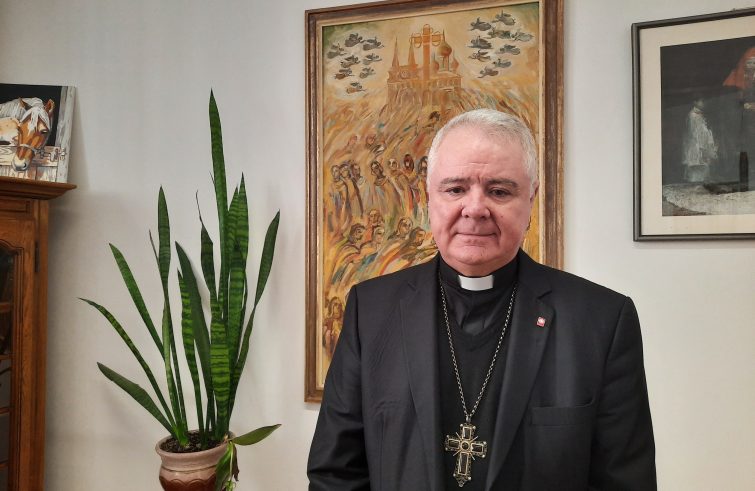
(from Chisinau) “Social life is undermined by deep tensions, by countless difficulties both politically and economically. These tensions have a strong impact on people’s everyday lives, causing serious concerns. But the Church is there for the people, as always, on the side of its people, on the right side of goodness, confident that evil will not have the last word.” Msgr. Anton Cosa, Bishop of Chişinău, welcomed SIR into his home. It is located near the cathedral and right behind the presidential and parliamentary buildings. The weather is cold but sunny, and city life runs peacefully, even though, just a few days ago, thousands of Moldovan citizens protested against the government, the high cost of living and soaring energy bills on these same streets. Our concern today, says the bishop, is that “even the Easter holidays could be hijacked and manipulated by politics.”
Your Excellency, what’s going on?
It’s a very difficult and complex moment.
The impression is that all these protests and demonstrations are being exploited by some political parties and power groups seeking to impose a different political approach. They are capitalising on the difficulties of ordinary people, such as high utility bills and rising commodity prices, but they are exploiting them in a negative way. Indeed, the prices are high. And people don’t have enough money to pay their bills, although they receive government subsidies according to differentiated income brackets. This is all true. But asking the government to pay the full amounts is not realistic. These are forced proposals whose sole purpose is to sow confusion and instigate protests.
These demonstrations are mostly driven by pro-Russian parties. Thousands of people took to the streets. But on whose side does Moldova stand?
Moldova has two souls.
Over the last 150 years, from 1812 until today, it was closely intertwined with the Russian world. We inherited the language, literature and traditions from Romania. This heritage was further enriched with that of the Russian world. Nowadays, the people of Moldova are caught between these two worlds. A large portion of the population is of Russian descent, they speak and think in Russian, their culture is Russian, they are connected in various ways to the Russian world. They are everywhere, even in our parishes.
EU Council President Charles Michel, on an official visit to Chisinau a few days ago, assured that the EU plans to start Moldova’s accession negotiation process “by the end of the year.” How does this process of joining the EU take shape against this general backdrop?
The European vocation in Moldova stems from the large-scale emigration of many Moldovans to Europe. Nowadays, virtually every household has one, two, three family members living in Italy, Portugal, England, Ireland and elsewhere in Europe. Nevertheless, this European vocation has been manipulated by insincere politicians whose sole concern is their own economic and political agenda. Over the past few years, we proceeded by taking two steps forward and three steps back. Moreover, without a parliament majority, it has been hard to make a decisive move towards European integration. The incumbent President Maria Sandu is a charismatic woman who has won the support of many Moldovans and politicians in both Europe and the USA. She initiated a veritable European integration movement.
I hope so because Europe is the path towards authentic Christian values that are not based on nationalisms of any sort but on the principles of democracy, freedom, justice and respect for the rights of each person. This is Europe.
Conversely, where would the alternative lead Moldova?
Along the opposite path. Instead of growing and progressing, it could exacerbate existing divisions with the creation of new political parties and movements that divide rather than uniting forces.
To what extent has the war in Ukraine affected the country?
In economic terms, it brought about a radical and devastating transformation. We went from leading a comfortable life to an abrupt spike in prices and gas bills. However, those who are suffering most from the Ukrainian conflict include the residents of Transnistria. I recently returned from Tiraspol where I made a pastoral visit to the local parishes. They are facing major difficulties. Although they receive aid from Russia, and the prices are much lower than in Moldova, they cannot enter and leave the country freely. The borders are closed. With their identity papers their only access route is to Moldova. And they need a second passport to go elsewhere.
They feel isolated and threatened by the war in neighbouring Ukraine.
People used to come up to me and ask: “who will help us?”. And I would answer: “we will always there for you. Whatever happens, do not be afraid. We will always be on your side.”
How many Catholics are there in Transnistria?
There are six parishes with five priests and a total of one thousand believers approximately. Many of them are of Polish descent, but church services are celebrated in Russian.
In this atmosphere of radical transformation, protests, concerns for the future, what is the Church’s message to the people of Moldova?
I repeat what we have been saying in these past few difficult months: trust in the Lord and never lose hope. Evil will never prevail. As Church we will always be on the right side of goodness, receptive to the values of Revelation and we will not stop in the face of difficulties because
we know that throughout the course of history, God has always guided us with mercy and love and helped us through the deserts, leading us to oases and calm waters. I can see this even now, and I hope that this upcoming Easter celebration, will open people’s hearts to the joy of the Risen One and to hope.”











